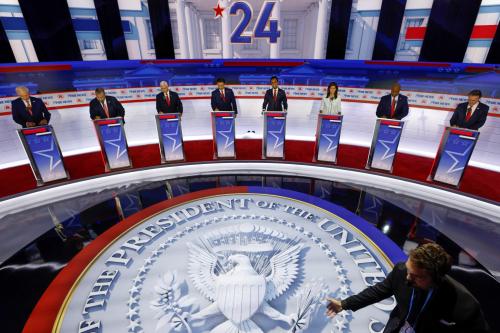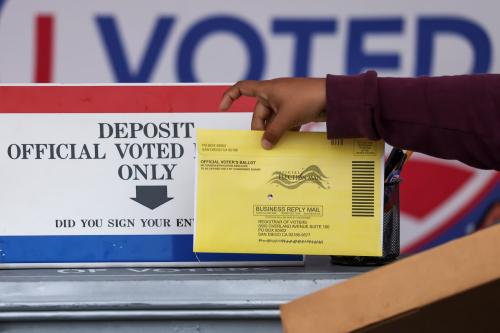This was a big week in American politics. It began with a devastating poll showing that Donald Trump was beating Joe Biden in a presidential match up in five out of six swing states. Then, on Tuesday, the voters spoke for the last time until the Iowa caucuses happen in mid-January and delivered the Democrats a very good night in multiple states that underscored the continuing power of the abortion issue. And on November 8, the five remaining challengers to former President Donald Trump met in their final debate of the year, an event that revealed the continuing struggle of Republicans opposed to renominating Trump to coalesce around an alternative to him.
What have we learned from these events?
1. Biden’s unpopularity does not mean that voters won’t vote for Democrats.
Our political system is obsessively focused on the President of the United States — his prospects, preferences, personnel, and health. During election years, there is considerable attention to his poll numbers and overall political standing. But as the special elections in 2021, the midterm elections in 2022, and now the off-year elections of 2023 have shown, President Biden’s unpopularity has failed to have the devastating effects on Democratic candidates that were widely predicted by pundits. For example, in September, analysts at FiveThirtyEight looked at 30 special elections that took place before the 2023 November elections, mostly state legislative seats. They calculated the seat’s base partisanship — their historical tendency towards one party or another — and then looked at the vote margin for Democrats running in those seats. On average, Democratic candidates in these races did about 11 points better than their historical average.
On election night 2023, Democrats won control of the Virginia legislature following a campaign in which the incumbent Governor Glenn Youngkin spent a lot of money and pulled out all the stops in an attempt to get a legislature which could help him enact a conservative agenda and catapult him into the presidential race. Instead, the opposite happened, and Democrats retained control of the Senate and gained control of the House of Delegates. We looked at the most competitive races (according to ABC News) in the Virginia Senate and House of Delegates to see what kind of a swing there was.
Because of redistricting, we can’t compare the 2023 vote precisely to the 2019 vote. But thanks to the Virginia Public Access project, we can compare how Senate and House candidates performed against the vote in their district for governor in 2021. In these 13 close Senate and House districts, the Republican Governor Youngkin won all but one in 2021, but in 2023, Republicans won seven (one remains too close to call), and Democrats won five. Democrats managed to flip a few seats — enough to retain control of the Senate and take control of the House of Delegates.
In the seven districts where Republicans won, their margin shrank compared to Youngkin’s vote in 2021. For instance, in Senate District 27, Republican Tara Durant performed 6.31 percentage points worse than Youngkin did in 2021, winning by only 2.19% of the vote compared to Youngkin’s margin of 8.5%.
A presidential star may have dimmed in Virginia, but one was born in Kentucky, where Democratic Governor Andy Beshear won re-election in a very Republican state, increasing his share of the vote from 49.2% in 2019 to 52.5% and winning several counties that had voted for Donald Trump in 2020. But Beshear will remain a lonely man. Every other statewide race in Kentucky went to Republicans. The votes for Attorney General and Agriculture Commissioner were virtually unchanged from four years before. The Republican Secretary of State saw a substantial increase in his vote but the Republican candidate for state treasurer saw a small decrease in his vote. In Mississippi, the statewide races from governor on down saw Republicans winning by almost the exact margins they won in 2019. So don’t put either state in the Democratic column for 2024.
So, why the big difference between polls showing Biden in trouble and elections where Democrats do well? The easiest answer is that there is, perhaps, no relationship between the two; down-ballot Democrats might continue to do well in off-year and midterm elections, and Biden could lose nevertheless. A second possibility is that the polls are just wrong on a systematic basis due to single-digit response rates and their difficulty in measuring voter turnout. A third possibility is that the cost of living is a very powerful motivator and that voters blame the president but not other office holders for this problem. A fourth possibility is that voters just don’t like Biden because of personal characteristics such as his age and the perception that he is not a strong leader.
One thing is clear: The Biden campaign would be ill-advised to over-interpret the significance of these recent Democratic victories for the president’s prospects in 2024.
2. Where the right to choose is in question, the abortion issue is very powerful and helps the Democrats.
In those places where Democrats did well, the explanation was pretty simple: As in previous elections, if voters perceive that a woman’s right to abortion is on the ballot in some fashion, pro-choice candidates do well. In Kentucky, where a six-week ban on abortion and a trigger law was upheld by the State’s Supreme Court, access to abortion is difficult, despite the defeat of a constitutional amendment denying any protections for abortion by a large margin in November 2022.
The abortion issue remains top of mind in Kentucky, and Beshear’s campaign for governor focused heavily on it, hammering his Republican opponent for his opposition to exceptions to an outright ban on the procedure.
In Virginia, abortion is currently legal up until the end of the second trimester. But Gov. Youngkin pushed for an abortion ban after 15 weeks that included exceptions for rape, incest, and the life of the mother. Democrats ran on this issue in almost all the competitive districts, and voters apparently rejected Youngkin’s proposal, which he termed a sensible compromise around which Republicans and the country could coalesce.
Those who persist in believing that the abortion issue doesn’t have continuing strength should look at another, even more powerful lesson from Tuesday night. The abortion referendum on the Ohio ballot, amending the state’s constitution to establish a right to “carry out one’s own reproductive decisions… including on abortion,” would preserve the right to abortion up to 23 weeks. The Ohio referendum won with 56.6% of the vote, garnering support from one in five Republicans and carrying 18 counties that Trump had won in 2020.
The Ohio referendum was the latest victory of the pro-choice movement in solidly conservative states. In Kansas, the pro-choice referendum garnered 59% of the vote; in Montana and Kentucky, 53%. In Michigan, a swing state, the pro-choice position got 56% of the vote, and in the liberal states of Vermont and California, it got 73% and 68% of the vote.
3. The Republican debate revealed both Republican divisions on abortion and the impact of President Biden’s weak standing in national polls on the Republican race.
Chris Christie argued that abortion should be left to the states while Tim Scott advocated a national ban on the procedure after 15 weeks, a stance that is likely to be more popular in the Republican primary contests than in the general election. Nikki Haley argued that such a ban has no chance of gaining enough support in the Senate and renewed her plea for a consensus-based approach to the issue, a stance that would play better in the general election than among socially conservative Iowa Republicans. For his part, Ron DeSantis ducked, contenting himself with criticizing the weakness of Republican efforts in state referendum contests.
Meanwhile, the man who wasn’t on the stage — former president Trump — has made it clear that he regards abortion as a political loser for Republicans and will do his best to deemphasize it as a national issue in 2024. If he is the Republican nominee, Democrats are unlikely to let him off the hook and will remind voters of his central role in selecting three Supreme Court justices who voted to overturn Roe v. Wade.
No matter whom the Republicans select as their standard-bearer, the issue will remain important in the national debate, although probably not as central as it has been in the states since the Court ended the Roe era. The presidency is a distinctive office whose occupants are held responsible for the economy and national security, not just their stance on social issues. Reflecting this reality, the moderators of the debate led with the conflicts in Ukraine and the Middle East, waiting to raise abortion until close to the end of the event. No doubt President Biden’s campaign will try to capitalize on the pro-Democratic tilt of this issue, but he will be judged by his performance in other areas as well. Abortion will be helpful to him in 2024, but it is not the silver bullet that will help him defeat his Republican opponent.
As the debate moderators indicated with their opening question, there is a central question that each of the candidates on stage needed to answer: Why would I be a better nominee than the man who isn’t here tonight? President Biden’s current weak standing in the polls is limiting their responses. Back in the spring, they hoped to be able to argue that while Donald Trump was a fine president, he was likely to lose to Biden in 2024 as he did in 2020. But now, with recent polls indicating that Trump leads Biden nationally and in key swing states, his Republican challengers are forced to offer more substantive answers that risk antagonizing Trump’s supporters.
Nikki Haley went the farthest down this road, criticizing him for allowing the national debt to rise by $8 billion during his presidency and for being “weak in the knees” on Ukraine and other foreign policy issues. Ron DeSantis said that Trump is “a lot different guy than he was in 2016” and held him responsible for a string of Republican losses since then. Chris Christie focused on Trump’s legal difficulties, arguing that “anybody who’s going to be spending the next year and a half of their life focusing on keeping themselves out of jail . . . cannot lead this party or this country.” It remains to be seen whether any of these arguments will gain traction with a Republican electorate that seems inclined to give Trump a pass on all of them.
Indeed, the big winner of last night’s debate may well have been the man who boycotted it. DeSantis performed better than he had in the two previous debates, and Haley — though strong — was less dominant. If DeSantis’s improved showing slows her effort to emerge in Iowa as the principal alternative to Trump, she may not gain the momentum she would need to defeat Trump in New Hampshire, an outcome that would destroy his aura of invincibility and transform the contest for the Republican presidential nomination. The political landscape has been frozen in time for some months now, with an incumbent president and a former president at the top and everyone else vying for attention.
As international events unfold, the question is: Will anyone or anything change this equation, or will we be looking at the widely anticipated rematch?
The Brookings Institution is committed to quality, independence, and impact.
We are supported by a diverse array of funders. In line with our values and policies, each Brookings publication represents the sole views of its author(s).









Commentary
Three things we learned from the 2023 elections and the GOP debate
November 9, 2023